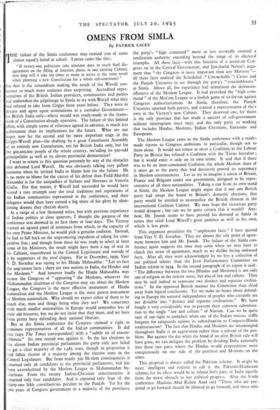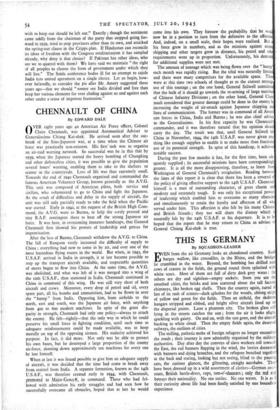OMENS FROM SIMLA
By PATRICK LACEY
THE failure of the Simla conference may remind you of sums almost equally hated at school. I mean sums like this:
" If twenty-one politicians take nineteen days to reach final dis- agreement on the filling of fourteen places in one existing Cabinet, how long will it take ten times as many to arrive at the same result when planning a new Constitution for a whole sub-continent? "
For that is the conundrum making the result of the Wavell con- ference so much more ominous than surprising. Accredited repre- sentatives of the British Indian provinces, communities and parties had undertaken the pilgrimage to Simla to try with Wavell what they had refused to take from Cripps three years before. They were to discuss and agree upon nominations to a caretaker Government— fur British India only—whose mould was ready-made in the frame- work of a Constitution already operative. The failure of this limited effort, with simple terms of reference agreed in advance, is much less unfortunate than its implications for the future. What are our hopes now for the second and far more important stage in the Cripps-Wavell plan—the drafting by a great Constituent Assembly of an entirely new Constitution, not for British India only, but for the 400,000,000 people of the whole country, including its Soo-odd principalities as well as its efeven provincial democracies?
I want to return to this question presently by way of the obstacles that defeated Lord Wavell. He was obviously talking very gallant nonsense when he invited India to blame him for the failure. He is no more to blame for the causes of his defeat than Field-Marshal Alexander is for the antipathies of Italians and Slovenes in Venezia Giulia. For that matter, if Wavell had succeeded he would have scored a rare triumph over the rival traditions and aspirations of the Indian communities represented at the conference, and their delegates would then have earned a big share of his glory by aban- doning dreams they cherish dearly.
At a range of a few thousand miles, but with previous experience of Indian politics at close quarters, I thought the purpose of the conference was doomed in its first three or four days. The Viceroy wanted an agreed panel of nominees from which, in the capacity of his own Prime Minister, he would pick a genuine coalition. Instead, he had to fallback on the unpromising expedient of asking for com- petitive lists ; and though from these he was ready to select at least some of his Ministers, the result might have been a tug of war in his Cabinet, exacerbated in the Central Legislature and outside of it by supporters of the rival cliques. For in December, 1939, Veer V. D. Savarkar was saying to his Hindu Mahasabha : " Let us face the unpleasant facts ; there are two nations in India, the Hindus and the Moslems." And however loudly the Hindu Mahasabha may accuse the Congress of " appeasing " the Moslems, whatever the Mohammedan chairman of the Congress may say about the Moslem League, the Congress 'is the most effective instrument of Hindu nationalism and the Moslem League is the most potent instrument of Moslem nationalism. Why should we expect either of them to be much else, men and things being what they are? We sometimes wish much smaller nationalities in Europe would remember less of their old histories, but we do not insist that they must, and we have been pretty busy defending their national liberties.
But at the Simla conference the Congress claimed a right to nominate representatives of all the Indian communities. It did this (says The Times correspondent) with a " subtle air of reason- ableness." Its own record was against it. In the last elections to the eleven Indian provincial parliaments the party only just failed to get a clear majority of the 1,585 seats, though in proportion it had fallen shorter of a majority among the elective seats in the Central Legislature. But from nearly 500 Moslem constituencies it returned only 26 candidates to the provincial parliaments, and has been overwhelmed by the Moslem League in Mohammedan by- elections. From the twenty Indian-Christian constituencies it returned only four candidates. And it captured only four of the thirty-one Sikh constituencies peculiar to the Punjab. Yet for the two years of Congress government in a majority of the provinces, the party's " high command " more or less avowedly asserted a totalitarian authority extending beyond the range of its electoral triumphs. All these facts—with this foretaste of a unitar.an Con- gress raj in the Central Government, and Jawaharlal Nehru's argu- ment that " the Congress is more important than any Ministry "- all these facts enabled the Scheduled t" Untouchable ") Castes and the Punjab Unionists to see through the party's " reasonableness " at Simla. Above all, the experience had stimulated the defensive- offensive of the Moslem League. It had provoked the " high com- mand " of the Moslem League to a foolish game of tit-for-tat against Congress authoritarianism. At Simla, therefore, the Punjab Unionists spurned both parties, and wanted a representative of then own in the Viceroy's new Cabinet. They deserved one, for theirs is the only province that has made a success of self-government without interruption since 1937, and the only party so working that includes Hindus, Moslems, Indian Christians, Eurasians and Europeans.
The Moslem League came to the Simla conference with a ready- made riposte to Congress ambitions in particular, though not to
them alone. It would not refuse to enter a Coalition, as the Labour Party in Britain has refused a Coalition with the 'Tories hereafter ; but it would enter it only on its own terms. It said that if there was to be an inter-communal Coalition, the whole Moslem share bf it must go to the party that had decisively proved its supremacy in Moslem constituencies. Let us try to imagine a union of Britain, France and Belgium under one government, designed to be repre- sentative of all three nationalities. Taking a cue from its own stand at Simla, the Moslem League might argue that if any one British party had swept the board in Britain's domestic elections, that party would be entitled to monopolise the British element in the international Coalition Cabinet. We may hope the victorious party would disagree ; but can we be quite certain that it would? Any- how, Mr. Jinnah seems to have pressed his demand at Simla in terms that tried Lord Wavell's great patience as well as his own,
which is less great. • This argument postulates the " unpleasant facts " I have quoted from Veer V. D. Savarkar. They are almost the sole point of agree- ment between him and Mr. Jinnah. The failure of the Simla con- ference again suggests the time may come when we may have to clutch this straw of agreement, much as we dislike facing awkward facts. After all, they were acknowledged by no less a collection of our political talents than the Joint Parliamentary Committee on Indian reform in 1934. In the second paragraph of its report it said: " The difference between the two [Hindus and Moslems] is not only one of religion in the stricter sense, but also of law and culture. They may be said indeed to represent two distinct and separate civilisa- tions." In the approved British manner the Committee then shied away from logical conclusions. Yet we make no bones about defend- ing in Europe the national independence of peoples who certainly arc not divisible into " distinct and separate civilisations." We have fought a very considerable war to prevent their common subordina- tion to the single " law and culture " of Nazism. Can we be quite sure of our right to complain when one of the Indian nations stiffly bargains for safeguards against its subordination to Congress-Hindu totalitarianism? The fact that Hindus and Moslems are intermingled throughout India is an aggravation rather than a solvent of the pro- blem. But against the day when the bond of an alien British rule will have gone, we can mitigate the problem by dividing India nationally into those two parts where the Hindus would preponderate most conspicuously on one side of the partition and Moslems on the other.
This proposal is always called the Pakistan scheme. It might be more intelligent and realistic to call it the Pakistan-Hindustan scheme, for its effect would be to release both parts of India equally from the worst obstacle to her political progress. After the Simla conference Maulana Abul Kalam Azad said "Those who are pre- pared to go forward should be allowed to go forward, and those who
wish to keep out should be left out." Exactly ; though the sentiment came oddly from the chairman of the party that stopped going. for- ward in 1939, tried to stop provinces other than its own, and attacked the opting-out clause in the Cripps plan. If Hindustan can reconcile its ideas of freedom with the Congress totalitarianism it has sampled already, why deny it that choice? If Pakistan has other ideas, who are we to quarrel with them? We have said we maintain " the right of all peoples to choose the form of government under which they will live." The Simla conference bodes ill for an attempt to cajole India into united agreement on a single choice. Let us begin, how- ever belatedly, to consider the pis tiller Mr. Amery suggested three years ago—that we should " sooner see India divided and free than keep her various elements for ever chafing against us and against each other under a sense of impotent frustration."



























 Previous page
Previous page